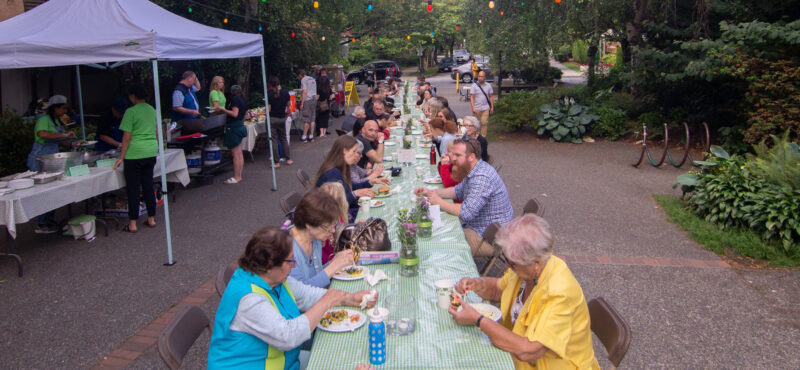Phone: 604-683-2554 | Email: welcome@gordonhouse.org
Powerful Ideas From GNH’S First ‘Community Conversation’ on Food
Getting people together to share ideas can be exhilarating and productive, especially when the topic is so central to our lives as food. That was the topic of a Community Conversation held at Gordon Neighbourhood House on January 14, 2014, which I had the pleasure of co-facilitating along with GNH Community Food Advocate Andrew Christie. We thank the roughly 40+ neighbours who attended and shared their experiences in trying to access good food and eat in ways that are healthy both for individuals and for community. Thank you as well to UBC Bachelor of Social Work practicum students Emily Melzer, Fibby Pan, and Markayla Benstead, who helped record participants’ ideas.
And there were a lot of ideas on the table. Reflecting on the experience later, Andrew Christie summarized what he saw as the main themes – and he did this so clearly and articulately that I’m going to quote him directly.
WRESTLING WITH AFFORDABILITY
“The first key theme I saw was the idea of affordability of healthy food. A couple of folks mentioned that the concepts of “Healthy” and “Organic” have become conflated, leading to a perception that a healthy diet necessitates paying higher prices for food. The reverse also seems to hold — that a perception exists that eating products branded “organic” is necessarily a healthy choice. We spoke briefly about the idea that “conventional” produce has the same nutritional value as its organic counterparts, and the importance of understanding, when shopping for food, that nutritional balance and diversity are more important than the word “Organic” on a label.
MAKING IT TRULY LOCAL
“The second key concept I identified was the idea of a “Local” food system. Local, in the sense that the food participants wanted to consume is grown somewhere near here, but also local in the sense that they don’t want to have to travel a great distance to obtain it, and local in the sense that they want to purchase it from businesses based here in our community, rather than larger companies based in Arkansas or California.
DEALING WITH THE PROBLEM OF ‘TIME’
“The third theme was the idea of “Time”–and this is a strong one for me, because I’ve heard this in a number of discussions I’ve been part of, and I think it needs more consideration when we frame policy and projects.
Planning meals, shopping for ingredients, preparing food, and eating food all take time, which is at a great premium for many people. Coupled with the need for all of these activities to take place in a social context, it creates an impossible task. Yes, we all can see the health and environmental benefits of preparing meals from scratch ourselves and sharing them with our friends and families, but when exactly can we do that? I know I’m lucky if I get the chance to prepare a meal for a friend once over the course of a week–and that’s not because people are unwilling to let me cook for them. And I don’t have kids, or work long hours, like many people.
EVERYBODY NEEDS SKILLS
“Finally, I want to touch on the idea of skills and education. The participants in the discussion identified a knowledge and skils gap which prevented folks from accessing healthy food, and though I can see the validity of the argument, I think we need to be very careful not to paint with too broad a brush here. It’s a common misconception that people who experience poverty do so because they are undereducated, or somehow lack knowledge or skills, and if only we could train people, their problems would be solved. This runs contrary to the realities many people experience. Though a skills gap exists with respect to cooking and nutrition, I have trouble correlating that gap with poverty, and believe that this gap affects people regardless of their economic status.”
Thank you, Andrew, for those powerful ideas. We plan to hold more Community Conversations in the near future, and welcome your comments
A special to the Gordon Neighbourhood House Blog by writer and educator Eleanor Boyle, www.eleanorboyle.com




